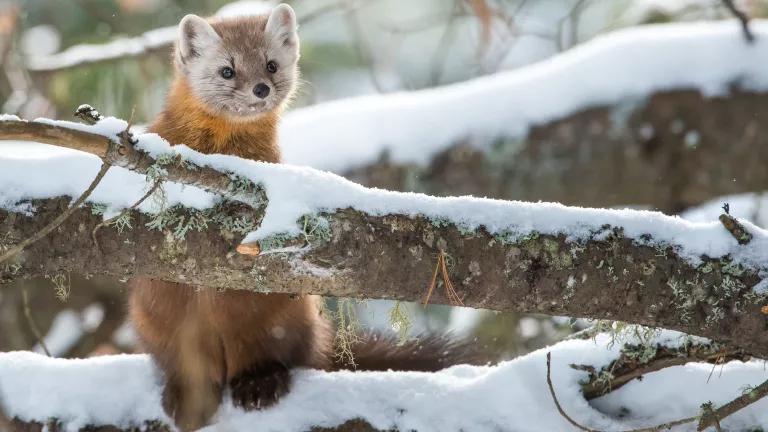Canadian Trade Group Opposes U.S. Anti-Deforestation Bills
The Forest Products Association of Canada (FPAC) claims that applying proposed anti-deforestation legislation in California and New York to the boreal forest would threaten its business model.

In the face of the rapid loss of our planet’s remaining intact forests, legislators in California and New York have introduced bold and essential measures to address the states’ role in driving the loss of these vital forests. While this legislation would take a meaningful step to protect intact forests and the rights of Indigenous Peoples across the world, Canada’s largest industry trade group—the Forest Products Association of Canada (FPAC)—is doing its best to stop these bills, claiming that boreal countries’ practices have no place in a bill address unsustainable logging.
One of the most powerful and cost-effective strategies for combatting global climate change and preserving our world’s biodiversity is to protect our world’s remaining intact forests. These intact forests, which have never been impacted by industrial activities, represent less than a quarter of Earth’s remaining forest cover, but play an outsized role in sequestering and storing carbon and preventing biodiversity loss. While there has been significant global attention on the need to protect our diminishing tropical forests, these bills bring attention to the often unseen loss of our northern forests. As my colleague Jennifer Skene writes, our northern boreal forests, found in Canada, Russian the United States and Scandinavia, are facing a quiet extinction. Sweden, Norway, Canada and Russia lead the world in trees lost per capita, while Russia, Brazil and Canada have the greatest intact forest loss in absolute terms.
The boreal forest is the most carbon-dense forest ecosystem in the world—acre for acre it stores nearly twice as much carbon as tropical rainforests. The world’s largest intact forest—Canada’s boreal forest—stores nearly twice as much carbon in its vegetation and soils as is in the world’s combined oil reserves. Keeping this carbon where it is, safely out of the atmosphere, is essential to meeting global climate targets.
Contrary to claims by FPAC about the sweeping bar these bills would place on sourcing from the boreal, these bills would allow any sourcing from boreal forests that is done sustainably – meaning without deforestation or degrading any intact forests. In North America’s boreal, intact forests account for about a third of managed forests, meaning that this bill would have no impact on the Canadian logging industry’s practices in over 370 million acres of its managed forest that has already been logged at some point in the past. If FPAC’s claims regarding the sustainability of Canada’s logging industry were true—this bill would have no impact on the operations of its members. The Canadian logging industry claims to have 100% regeneration of its forests. As a result, after decades of forest management, those 2/3 of the forest—over 370 million acres—should be more than sufficient to continue to supply wood products to New York and elsewhere.
Unfortunately, we know that the operations of many of FPAC’s members do not meet international sustainability standards and are contributing to the loss of the world’s largest intact forest and most important terrestrial carbon sink. In a report released by NRDC earlier this year—By a Thousand Cuts: How Powerful Companies Wood Sourcing is Degrading the Canada’s Boreal Forest—we detail how three of FPAC’s members, Resolute Forest Products, Domtar and Aditya Birla fail to require Free and Prior Informed Consent (FPIC) where they operate and source extensively from areas that contain intact boreal forests that are the habitat of the threatened boreal caribou. While some of these companies have Forest Stewardship Council (FSC) certified tenures, with few exceptions these companies’ operations in the intact boreal forests that are critical habitat for the boreal forests are not FSC-certified.
The industry has successfully blocked the implementation of basic provincial and federal safeguards to protect threatened species—and is now attempting to use the same tactics in California and New York. An industry that believes itself to be existentially threatened by legislation to place restrictions on practices leading to deforestation, intact forest degradation and the exploitation of Indigenous Peoples, needs to take time to examine its practices. There is a world in which FPAC and its members could be beacons of sustainability and lead the way for a forest industry whose practices are protective of climate, biodiversity and the rights of Indigenous Peoples. Sadly, that is not the world we live in today—and, as, demonstrated by FPAC’s efforts to block states’ efforts to ensure their own economies aren’t driving the loss of these climate-critical forests, is a part of their business model with which they have yet to reckon




